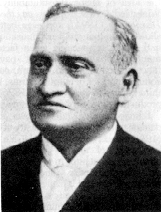| Profile | Major Works | Resources |
Enrico Barone, 1859-1924.

Italian military officer, economist, early disciple of Walras and Pareto and honorary member of the Lausanne School
Born in Naples, Enrico Barone enrolled in the Neapolitan Military Academy in 1874 and signed up for a career in the general staff of the Italian armed forces. The technically-minded Barone found an outlet for his abilities in military strategy and science and published articles on issues such as artillery targeting. In 1887, he began teaching military strategy at the Artillery School and collected his lectures in a 1887 textbook. Barone's treatment of military strategy went beyond merely its technical aspects to incorporate relevant economic and social situations. This gave him the excuse to begin reading widely in those fields.
The early 1890s marked the appearance of the "new" mathematics economics in the pages of the Giornale degli Economisti, edited by Pantaleoni. Barone was particularly impressed by the articles of Pareto (whom he would later refer to as his "master"). In 1894, Barone began contributing his own economics articles to the GdE and came into a fruitful correspondence with the members of the Lausanne School and other Neoclassical economists.
Enrico Barone was instrumental in convincing Walras to incorporate variable production techniques - and, by extension, marginal productivity theory - into the Walrasian system. Barone's most famous contribution, however, was in getting the "Socialist Calculation" debate started with his famous 1908 article. His position, later taken up by Taylor and Lange, was that it was indeed possible in a collectivist state for a planning agency to calculate prices in order to achieve maximum efficiency. But he did not think it could do "better" than a capitalist economy.
In 1908, Barone published his principal economics treatise, the Principi di economia politica.
Barone was also a capable public finance economist. His 1912 article was the first to apply indifference curve analysis to compare the relative burdens of income taxes and excise taxes. He was also an articulate opponent of "progressive" taxation schemes as they rested on what he considered highly dubious utilitarian calculations.
|
Major works of Enrico Barone
|
| HET |
|
Resources on Enrico Barone
|
All rights reserved, Gonšalo L. Fonseca
